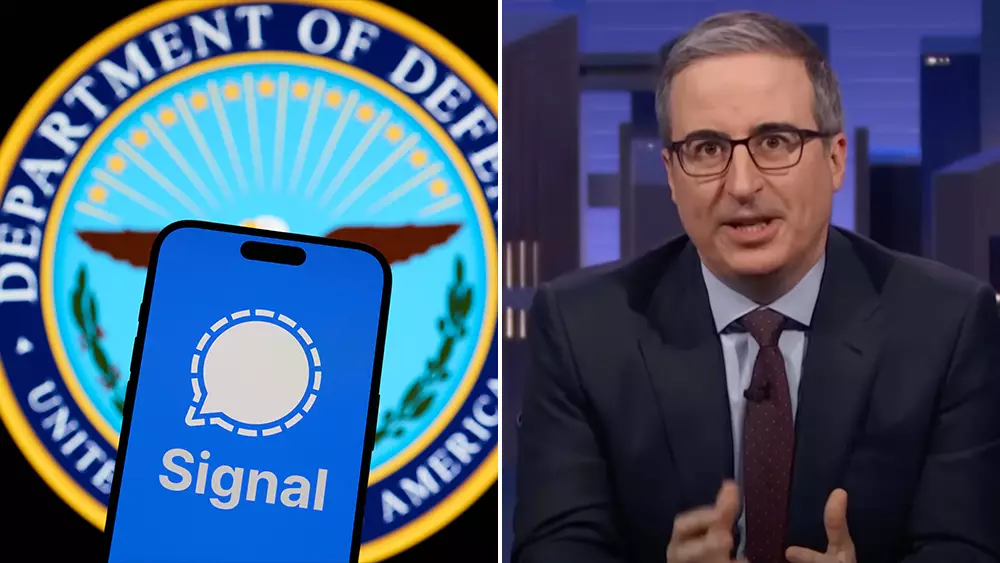In an era where political rhetoric often overlaps with comedic absurdity, the line between genuine governance and sheer farce seems to blur, notably illustrated by John Oliver’s incisive critique of Donald Trump’s administration. Following the catastrophic Signal group chat leak and the subsequent exposé by The Atlantic, Oliver’s take on the situation resonates well beyond a mere comedic lens. What this highlights, in essence, is not just a failure in leadership but a profound lack of seriousness in handling grave national matters. When you consider the alarming emojis that surfaced from the discussions among key officials, like National Security Adviser Michael Waltz, it becomes evident that a prevailing culture of triviality looms large over crucial decision-making processes.
Oliver humorously surfaces the absurdities in the choice of emojis used in discussions about military operations. In a time when gravitas is necessary, the watering down of critical conversations to emoji-laden chats not only signals a lack of respect for the gravity of their choices but also raises questions about the judgment of those at the helm. The image of grown adults deliberating over emoji choices in the wake of bombings is both alarming and laughable, echoing the sentiments of former media tycoon Logan Roy’s blunt assessment of his progeny’s seriousness.
Laughing at Tragedy: The Ethical Implications
The ethical conundrum deepens when we scrutinize the nonsensical demeanor that, according to Oliver, seems to encapsulate the Trump administration’s modus operandi. Showcasing flippancy in the face of monumental disasters is not merely embarrassing; it poses a threat to the nation’s ethos. The cognitive dissonance of officials treating weighty matters with such a cavalier attitude starkly contrasts against the backdrop of suffering caused by policies such as mass deportations. The case of Venezuelan migrants wrongfully deported due to flimsy or nonexistent evidence highlights this inadequacy—an administration behaving like a callous reality show, where individuals’ lives are cheapened to plot twists.
Oliver extends his critique by reflecting on the harrowing visual of Homeland Security Secretary Kristi Noem standing before caged prisoners, likening it to historical atrocities undeniably linked with human rights violations. The image of political figures using disturbing visuals for PR stunts not only showcases a disconnect from humanity but raises unsettling questions about the memory of history and its repeating cycles. The grotesque utilization of suffering for photo ops starkly illustrates the moral bankruptcy of leaders who prefer the optics of power over the dignity of human life.
Pushback and Peril: The Cost of Cruelty
While Oliver reveals a landscape marred by incompetence and insensitivity, he juxtaposes it against the surging pushback from the populace against the draconian policies emerging from the administration. The ongoing backlash against mass deportations signifies a collective awakening to the absurdity and cruelty in governance. This resistance is paramount; however, it is equally crucial to acknowledge the damage that has already been inflicted upon marginalized communities.
The reckless decisions made within the confines of the Oval Office often reverberate far beyond their immediate consequences. The combination of cruelty and negligence not only fractures lives but also dismantles the moral fabric of the nation. Emotional and social costs accrue with every misguided policy; thus, the implications extend beyond mere political failures—they cloud the very ideals upon which the country was founded.
Oliver’s critique is a call to action dressed in humor but rooted in profound concern. As he sheds light on the unforgivable follies of the administration, he beckons audiences to engage thoughtfully with the very real consequences of political irresponsibility. This era invites us to ponder the underlying issues of governance, demanding that we hold our leaders to a higher standard. If not, we risk inviting generational repercussions of absurd governance that mirrors a tragicomedy rather than a functional state.

Leave a Reply